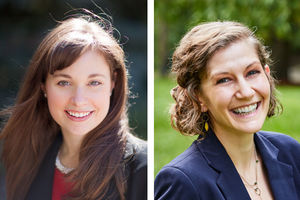
Two recent graduates of the Peace Studies Ph.D. program at the University of Notre Dame have secured strong post-graduate placements.
The Kroc Institute for International Peace Studies, part of the Keough School of Global Affairs, administers a joint doctoral degree that allows students to immerse themselves in the multidisciplinary field of peace studies paired with one of six traditional disciplines housed in Notre Dame’s College of Arts and Letters. Graduates of the peace studies doctoral program are fully trained and equipped for a wide variety of scholarly, teaching, and professional careers, including interdisciplinary academic positions and scholar-practitioner roles in intergovernmental, governmental, or nongovernmental organizations.
During their time at the Institute and in the years immediately following graduation, peace studies graduates are accompanied by a placement director, a Kroc Institute faculty member who provides career coaching and counseling, interview preparation support, and networking opportunities to ensure that graduates are able to find placements that meet their career goals.
“I am not surprised that Dana and Kristina each won their highly competitive positions,” said George A. Lopez, placement director for doctoral students and Rev. Theodore M. Hesburgh, C.S.C., professor emeritus of peace studies “In each case, their institution was looking for a smart, versatile scholar-practitioner who could guide a new, emerging program within an already successful institution. Both of them had substantial field work experience, wrote multi-method articles and dissertations, and have the kind of cross-disciplinary perspective so needed in research, practice and policymaking.”
Kristina Hook, who graduated in May 2020 with a degree in peace studies and anthropology, has been hired as research assistant professor and inaugural executive director of the Better Evidence Project, part of the Center for Peacemaking Practice at George Mason University’s Jimmy and Rosalynn Carter School for Peace and Conflict Resolution (formerly the School for Conflict Analysis and Resolution).
The Better Evidence Project seeks to address the issues of war and violence by improving evidence and data available for use by donors, policymakers, practitioners and scholars engaged in peacebuilding work. Hook feels confident that the multidisciplinary education she received at Notre Dame has equipped her well for this new role.
“I am looking forward to focusing professionally on translating applied peacebuilding data for a variety of audiences, something for which our time surrounded and mentored by Kroc’s diverse cadre of scholar-practitioners prepared me,” said Hook. “Our Kroc Institute program not only taught us to grapple with interdisciplinary differences regarding what might constitute ‘best evidence,’ but also to move through these creative tensions in productive ways, including by debating these questions in our classes, in our dissertation committees, and even in our own cohorts.”
In the practitioner realm, Dana Townsend, a 2019 graduate with a doctorate in peace studies and psychology, has accepted a position as a mental health and psychosocial support specialist with the SAMS (Syrian American Medical Society) Foundation, an organization working to provide medical relief services for refugees, internally displaced individuals, and the communities supporting them. She will be based in Washington, D.C.
Townsend will draw on her training to provide psychological support for individuals who have been displaced by the ongoing war in Syria. She will also partner with researchers to help develop new psychosocial support programs and publish results from SAMS initiatives.
“The core of this position is using behavioral science to support individuals displaced by armed conflict, so it combines psychology and peace studies in a way that few positions do,” said Townsend. “Because the programs we’re implementing are situated within the broader context of the war and refugee crisis, I am mindful of how they contribute to peacebuilding and long-term recovery. There's a lot of attention on making sure these programs are culturally valid, locally-owned, and sustainable.”
Learn more about the Peace Studies Ph.D. program at kroc.nd.edu/phd.
Contact: Kevin Vaughn, assistant director for doctoral studies, krocphd@nd.edu